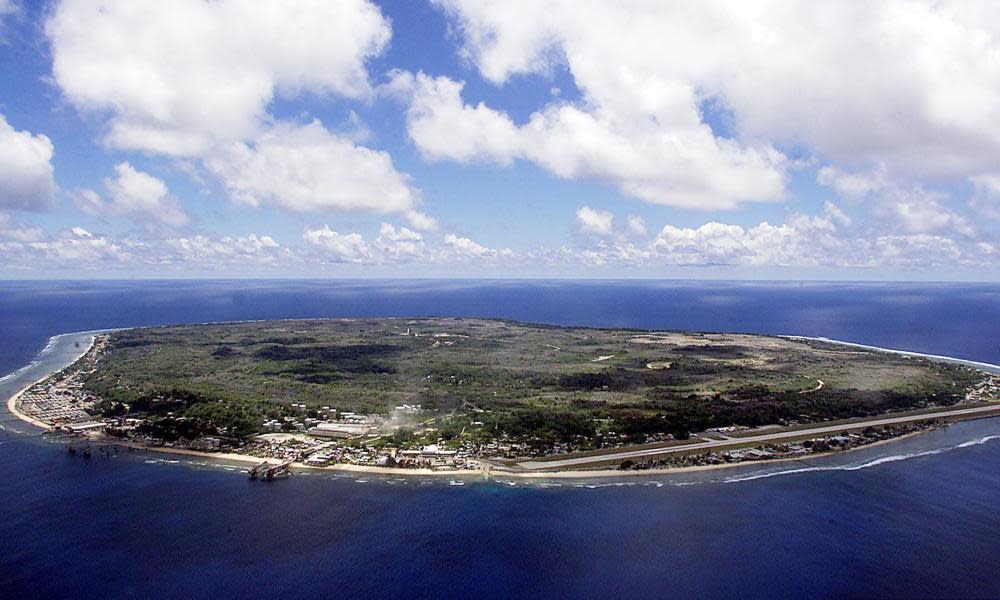Nauru hunger strike: Border Force abandons multiple attempts to move child to Australia

Efforts to move a 12-year-old refugee boy on hunger strike on Nauru to a hospital in Australia failed at the weekend, after the Australian Border Force refused to allow his stepfather to travel with him.
The 12-year-old boy weighs just 36kg and cannot stand up, after more than two weeks refusing food. He is at risk of death within days, doctors on the island said.
Doctors have demanded he be flown by air ambulance off the island, after plans to take him on commercial flights from Nauru to Australia were twice abandoned by Border Force at the weekend.
The latest medical assessment of M – whose identity cannot be disclosed – warns “we are reaching a critical time”.
M is an Iranian refugee who has been held on Nauru with his family since he was eight. The assessment was conducted by doctors on Nauru on Sunday and has been sent to senior staff within the medical services provider IHMS, Border Force and the Department of Home Affairs.
The assessment, seen by the Guardian, warns M could die without hospital-level intervention of a type that does not exist on Nauru.
“He is now at day 19 of food refusal,” his treating doctor wrote. “Likewise apart from sips of water and the ... dextrose solution that he was given, he has not had any significant oral hydration. His last bowel motion was 15+ days ago and he rarely passes dribbles of urine painfully.”
Doctors have refused to forcibly treat the child against his and his parents’ will.
“I would not be prepared to treat M against his will [using] restraint or medical sedation,” the treating doctor wrote. “We carried out the latter a week ago, because we believed … his father gave written consent. It resulted in him refusing to re-attend the clinic. This treatment is not sustainable.
“With regards to him being treated at [Republic of Nauru] hospital, the consequences of that lie with the Australian government.
“Currently M needs urgent evacuation by air ambulance … He is not fit to travel on a commercial flight.”
The ABF agreed to let the boy leave Nauru on Sunday but then refused to allow his stepfather to accompany him. The boy then refused to go.
A doctor was also booked on the flight. After negotiations to get the boy to fly failed, the plane left without him.
On Monday morning, the ABF ordered an air ambulance to medivac the boy from the island, but without any family members. The Guardian understands he has refused to go, and ABF sources say they are concerned about the legality of forcibly removing a child from his parents.
M has been traumatised by his time on Nauru, according to a mental health assessment. He cannot read because he has been given faulty glasses, and he has been bullied and spat on when he tried to attend school in Nauru. Most of his refugee friends have been moved to Australia.
The assessment reads: “M presented with symptoms that meet diagnostic criteria for major depressive disorder … M had a deterioration of his mental health … reaching a stage of a suicide attempt.
“He declared being extremely tired of living on Nauru and he could not imagine spending the rest of his life in Nauru. M stated that he had been bullied by Nauruans and every time he was waiting for a bus at the bus stop he had Nauruans spitting on him and telling him to get out of Nauru.”
The Department of Home Affairs has declined to comment on M’s case. Repeated requests to interview the ABF’s chief medical officer, Dr Parbodh Gogna, have been declined. He told Senate estimates this month the medical services on Nauru were better than those in regional and rural Australia.
“It’s very well staffed. There are significant assets there. There’s near-patient pathology. There’s expertise in specialists. It’s something that the Australian government should be proud of.”
There is a critical and growing concern over the lives of the 119 children who remain on Nauru after more than five years of offshore detention on the island.
There have been dozens of suicide attempts by children as young as 10 on Nauru, including attempts at self-immolation.
At least 14 children have been brought off the island after successful legal challenges were either won in court in Australia, or conceded at the last moment by the Department of Home Affairs.
The federal court has consistently found medical facilities to treat psychological illnesses or complex physical conditions do not exist on Nauru. The court has also found that detention on the island is causing harm to children.
Sources inside the regional processing centre confirmed that high-profile or politically sensitive medical cases are decided not by the ABF but by executive-level officials of the home affairs department – in some cases, the secretary of the department or even the minister. ABF decisions made on Nauru are often overruled by senior officers in Canberra.

 Yahoo News
Yahoo News 
